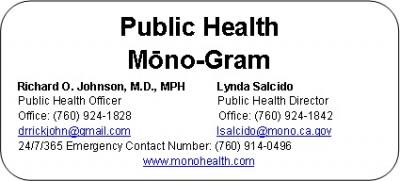Mono-Gram - Flu Season will Arrive Soon! 9/28/2015
Monday, September 28, 2015
Time to Act – Flu Season will Arrive Soon!
What do you predict will happen this year?
Someone said, “Prediction is very difficult, especially about the future”. One thing we know for certain – we will experience an epidemic of seasonal flu this winter. However, it is not possible to predict what this flu season will be like. Flu spreads every year, but the timing, severity, and length of the season varies from one year to the next. Flu outbreaks can happen as early as October, and can last as late as May. The first indicator is usually a rise in respiratory illness in a community, followed by an increase in hospitalizations, and then flu-associated deaths. The peak is usually in January or February.
What should I do to protect myself and my loved ones?
The first and most important step to protect against this serious disease is for everyone older than 6 months of age to get a yearly flu vaccine, unless there is a medical contraindication. Everyone should get vaccinated as soon as flu vaccine becomes available, to ensure that as many people as possible are protected before flu season begins. However, as long as flu viruses are circulating in the community, it’s not too late to get vaccinated. In addition, you can take everyday preventive actions like staying away from sick people, washing your hands to reduce the spread of germs, and staying home from work or school if you are sick.
Who should be vaccinated, and why?
Everyone older than 6 months of age should be vaccinated each year. Why?
a. A vaccine each year is necessary because protection begins to wane over time, and because the viruses may be different each year.
b. Vaccine has been shown to reduce influenza illnesses, doctors’ visits, influenza-related hospitalizations, and deaths
c. The elderly (>65 years of age) suffer most of the complications and deaths from influenza. In spite of this well known fact, a dismal % of older adults typically get vaccinated. Highest risk is for those with underlying medical conditions, such as heart disease and diabetes.
d. Herd protection is a real phenomenon that has great potential to protect the most vulnerable in our communities. It has been shown that the vaccination of not only children, but also young adults, will work to prevent influenza in the elderly. As vaccine coverage of younger adults (age 18-64) increased from 15% to >31%, the odds of an elderly individual in that community contracting the flu diminished by 20%, as did pneumonia rates.
e. Since infants <6 months of age cannot be vaccinated, and are at high risk of complications and death if they get sick, all persons around them should be vaccinated.
f. Children should be vaccinated for several reasons:
1. Last year, 43% of children hospitalized with influenza were previously healthy, without any known underlying medical conditions.
2. Children with underlying medical conditions are especially vulnerable, as 26% of children hospitalized last year had underlying asthma.
3. Children are frequently around older adults, especially during the holidays. We would hope that frequent hugs and kisses would not transmit the flu!
g. Flu is more likely to cause severe illness in pregnant women than in women who are not pregnant. Changes in the immune system, heart, and lungs during pregnancy make pregnant women (and women up to two weeks postpartum) more prone to severe illness from flu, as well as to hospitalizations and even death. Pregnant women with flu also have a greater chance for serious problems for their unborn baby, including premature labor and delivery. The flu shot given during any trimester of pregnancy has been shown to protect both the mother and her baby (up to 6 months old) from serious illness due to the flu and its complications. The nasal spray vaccine should not be given to women who are pregnant. The flu shot has been given to millions of pregnant women over many years, and have not been shown to cause harm to pregnant women or their babies.
If I get vaccinated, can I still get the flu?
Yes, it’s possible for you to get sick with the flu even if you have been vaccinated (although you won’t know for sure unless you get a flu test). This is possible for the following reasons:
a. You may be exposed to a flu virus shortly before getting vaccinated or during the 2 weeks it takes for your body to gain protection from the vaccine.
b. You may be exposed to a flu virus that is not in the vaccine. Last years’ vaccine was not as effective as usual due to a mutation (or drift) in one of the viruses that circulated. So far evidence is pointing to an excellent match between the vaccine and the flu viruses that are circulating.
c. Unfortunately, some people can become infected with a flu virus the flu vaccine is designed to protect against, despite being vaccinated. Let me be clear – you cannot get infected with the flu from the vaccine – but the vaccine does not work in 100% of persons. Protection varies widely, based in part on health and age factors of the person getting vaccinated. It works best in younger adults and older children, and less so in older people and those with certain chronic illnesses. Flu vaccine is not a perfect tool, but it is the best one we have!
Are there any new recommendations this year?
a. Healthy children age 2 through 8 years who have no contraindications or precautions may receive either an injection or the nasal vaccine, with no preference expressed for either vaccine when one is otherwise appropriate and available. This removes the previous preferential recommendation.
b. Children aged 6 months through 8 years who have previously received greater than or equal to 2 total doses of flu vaccine of any type at any time before 7/1/5, require only one dose for 2015-16. The 2 previous doses do not need to have been given during the same or consecutive seasons.
c. Children age 6 months through 8 years who are being vaccinated for the first time or who have not previously received a total of greater than or equal to 2 doses, require 2 doses of influenza vaccine, given greater than or equal to 4 weeks apart.
d. Although a high dose injection has been shown in one study to give better protection in those over 65 years of age, the Centers for Disease Control and Prevention (CDC) says more research is needed before making an official recommendation for one over the other.
Where can I get vaccinated?
Influenza vaccine is available in multiple locations, including your healthcare provider, pharmacy, or health department. More vaccine has been produced this year than ever except for the 2009 H1N1 pandemic, so availability should not be an issue. Pharmacies have had vaccine since August, healthcare providers are currently receiving theirs, and health departments are conducting their outreach during the months of October and November.
NOW IS THE TIME TO GET VACCINATED!


